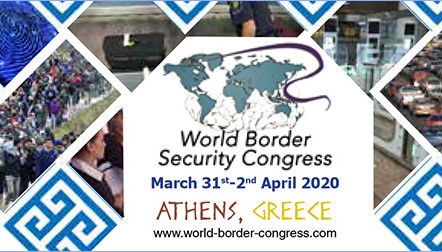World Border Security Congress2020-02-12 17:32:00
Greece is Boosting its Security on Land and Sea
According to recent reports in the press, Greece is stepping up security on its land border with Turkey and planning to use a floating barrier at sea to help stop migrants from reaching the Greek islands from the nearby coast of Turkey.
The government plans extra guards supported by a network of new surveillance systems as well as the floating barrier off the coast.
The resurgence in the number of migrants and refugees arriving by sea to Lesbos and other Greek islands has caused severe overcrowding at refugee camps.
With Greece now the main point of entry into Europe, the global border community will gather in Ath-ens for the annual World Border Security Congress (March 31st to April 2nd) to discuss the most pressing border management issues faced worldwide.
The latest speakers include:
- Vladimir Pivovarov, National Coordinator, National Coordinative Centre for Integrated Border Management, North Macedonia
- Guido Ferraro di Silva e Castiglione, Commander (ITA Coast Guard, Res), Transport and Border Security Unit, Joint Research Centre, European Commission
- Cristina Gatões, National Director of the Immigration and Border Service, Portuguese Immi-gration and Border Service (SEF)
- Jim Nye, Assistant Chief Constable – Innovation, Contact & Demand & NPCC Maritime Lead, Devon & Cornwall Police, UK
- Dr Aikaterini Poustourli, Scientific/Technical Officer, Capacity Building, IHU-ΔΙΠΑΕ, Greece
2020 Congress Topics include:
The Latest Threats and Challenges at the Border
With the final collapse of the so-called IS Caliphate, returning foreign fighters are a particular chal-lenge for the next few years, but mass migration, transiting terrorists, cross border organised crime, human trafficking, small arms, weapons of mass destruction and drug smuggling will continue to be areas of major concern for the global border community.
Continuing efforts against foreign terrorist fighters, irregular migration and human trafficking
How we deal with foreign terrorist fighters, irregular migration and human trafficking are inextricably linked. Because it is through clandestine trafficking networks that foreign fighters will attempt to re-turn to their countries of origin or to other destinations. They may also attempt to return through con-ventional travel networks by the use of forged or lookalike documents. Or they may hide among genu-ine refugees as we have already seen. These experienced fighters pose a real threat to their communi-ties. API and PNR are part of the answer but what else can we do to meet this challenge?
Capacity Building and Training in Border and Migration Management
Enhancing capacity and migration management through by improved technical support and knowledge; administrative ability; promoting mechanisms for co-operation and the exchange of exper-tise between migration management personnel and the strengthening the monitoring and oversight.
Securing the Littoral Border: Understanding Threats and Challenges for Maritime Borders
Our coastline borders present huge security challenges for the border community. With dramatically varied terrain from mountains and cliffs to beaches and swamps. Tens of thousands of kilometers of extended coastline with multiple lonely bays, Inlets, estuaries and Islands that can all be exploited by terrorists, illegal migrants, drug and arms smugglers, human traffickers and organised crime. How do we secure this complex and challenging environment?
Pre-Travel Risk Assessment and Trusted Travellers
With a plethora of trusted traveller programs around the world, how can we make legitimate travel more seamless? Is it possible to provide better connectivity between programs? How can API / PNR play a role on pre-travel risk assessment.
The developing role of Biometrics in identity management & document fraud
Formal identification is a prerequisite for effective border control. Document fraud has become an enabler of terrorism and organised crime and is linked to the trafficking of human beings and migrant smuggling. Facial recognition, fingerprinting and iris scan are now maturing technologies with increas-ing accuracy and performance. What is the developing and future role of biometrics in managing iden-tity and our borders, and how are associated technologies best utilised to bridge the gap and under-documentation, so widespread in the developing world?
Smuggling & Trade in Illicit Goods, Antiquities and Endangered Species
The global trade in endangered species, over 1.5million transactions per year, will drive some species to extinction if the trade is not stopped. The cultural damage inflicted by the global trade in antiquities, valued over $20 billion, cannot be quantified but is all too easily understood. So, what can the border community do to stem the flow and illegal trade of illicit goods, antiquities and endangered species?
The Future Trends and Approach to Alternatives for Securing Borders
Brexit, the US/Mexico Wall, Greek/Turkish borders are forcing the debate about future border devel-opments. But could any or all of them really supply the blue print for the future of borders for land, sea and air? Has Integrated Border Management (IBM) proven successful? What’s the latest thought lead-ership in enhancing border protection and management to counter the ever changing challenges?
The 2020 World Border Security Congress is supported by the Ministry of Civil Protection of Greece, Center for Security Studies (KEMEA), Organization for Security & Co-operation in Europe (OSCE), African Union ECOSOCC (AU-ECOSOCC), European Association of Airport & Seaport Police, International Security Industry Organisation, National Security & Resilience Consortium and International Association of CIP Professionals.
